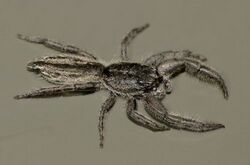Biology:Holoplatys apressus
| Holoplatys apressus | |
|---|---|

| |
| Scientific classification | |
| Domain: | Eukaryota |
| Kingdom: | Animalia |
| Phylum: | Arthropoda |
| Subphylum: | Chelicerata |
| Class: | Arachnida |
| Order: | Araneae |
| Infraorder: | Araneomorphae |
| Family: | Salticidae |
| Subfamily: | Salticinae |
| Genus: | Holoplatys |
| Species: | H. apressus
|
| Binomial name | |
| Holoplatys apressus (Powell, 1873)
| |
| Synonyms | |
|
Salticus apressus Powell, 1873 Holoplatys senilis Dalmas, 1917 | |
Holoplatys apressus is a species of jumping spider endemic to New Zealand.
Description
Holoplatys apressus are small with an unusually flat body (Which has been attributed to their habitat preference of small spaces under bark) that is typically black-brown with grey hairs covering the body. Adult males may have longitudinal black stripes along their abdomen.[1][2]
Taxonomy
Holoplatys apressus was first described as Salticus appresus in 1873.[1] Independently, Raymond Comte de Dalmas described Holoplatys senilis in 1917.[3] In 2002, S. appresus was moved to the Holoplatys genus and H. senilis was recognized as a synonym.[4]
Habitat
Holoplatys apressus can be found under the bark of Manuka and Kanuka trees. Some individuals have been found under the bark of exotic Pinus radiata and on driftwood, which has been suggested to imply that the species could have rafted from Australia .[4]
References
- ↑ 1.0 1.1 Powell, L. (1873). On the spiders of New Zealand. Part I. Genus Salticus. Transactions of the New Zealand Institute 5: 280–286
- ↑ Żabka, M. (1991b). Salticidae (Arachnida: Araneae) of Oriental, Australian and Pacific regions, V. Genus Holoplatys Simon, 1885. Records of the Australian Museum 43: 171–240.
- ↑ Dalmas, R. de (1917a). Araignées de Nouvelle-Zélande. Annales de la Société Entomologique de France 86: 317–430
- ↑ 4.0 4.1 Żabka, M. & Pollard, S. (2002c). A check-list of Salticidae (Arachnida: Araneae) of New Zealand. Records of the Canterbury Museum 16: 73–82
Wikidata ☰ Q598184 entry
 |

